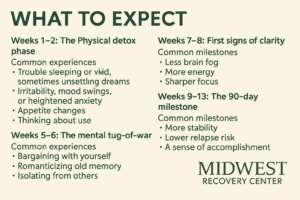When you quit THC—whether it’s your first time or your fifth—you expect some things to be hard. But maybe not like this.
Maybe you thought the worst would pass in a week or two. Then you hit day 30, day 45, day 72—and you’re still fighting brain fog, mood swings, or the nagging thought that using again would just be easier.
If you’ve been through marijuana addiction treatment before, you know recovery isn’t a straight line. The first 90 days are a unique stretch—equal parts fragile and full of possibility. Here’s what you can expect, week by week, and how to keep moving forward even when your brain is begging for the old way.
Weeks 1–2: The Physical Detox Phase
This is when your body starts flushing THC from your system, and your brain begins recalibrating its natural chemical balance.
Common experiences:
- Trouble sleeping or vivid, sometimes unsettling dreams
- Irritability, mood swings, or heightened anxiety
- Appetite changes—either eating everything in sight or nothing at all
- Fatigue or restlessness
If you’ve relapsed before, these symptoms can feel like a frustrating reminder of “starting over.” But they’re actually signs that your body is working exactly as it should.
Tips:
- Keep a consistent sleep schedule, even if you’re not sleeping well at first
- Hydrate regularly to help your body flush out toxins
- Move your body daily—walking counts
- Keep quick, healthy snacks on hand to avoid energy crashes
Weeks 3–4: The Emotional Adjustment
Physical symptoms start to fade, but this is when emotions can hit harder than expected. Many alumni describe feeling “emotionally raw” at this stage—small things trigger big reactions.
You might notice:
- Sudden waves of sadness or irritability
- Feeling socially out of place without THC
- Mental cravings, often tied to certain people, places, or routines
Why this happens: Your brain’s dopamine system is still adjusting. THC artificially boosted dopamine levels, so without it, you may feel a temporary lack of motivation or joy.
Tips:
- Avoid situations or environments tied to heavy cannabis use
- Journal daily to track patterns in mood and cravings
- Reconnect with sober peers or alumni networks for accountability

Weeks 5–6: The Mental Tug-of-War
This is when the bargaining voice often shows up: Just once. Just a little. I can handle it this time.
On the outside, you may look fine—back at work, socializing, even exercising. But inside, the craving cycle can be exhausting.
Common traps:
- Convincing yourself that you’ve “proven” you can control it
- Romanticizing old memories of using
- Isolating to avoid uncomfortable conversations about sobriety
Tips:
- Keep treatment tools close—meditation apps, support group meeting lists, or your sponsor’s number
- Share openly with at least one trusted person about your cravings
- If cravings are overwhelming, consider returning briefly to structured care for extra support
Weeks 7–8: The First Signs of Clarity
By this stage, many people notice subtle but meaningful improvements:
- Sharper memory and focus
- More consistent energy levels
- Feeling more present in daily life
But this can also be when complacency sneaks in. You start to feel good and think, Maybe I’m in the clear now. This is where discipline matters most.
Tips:
- Keep stacking healthy routines instead of dropping them
- Set short-term goals unrelated to sobriety (fitness, creative projects, learning something new)
- Celebrate small wins without using substances as a reward
Weeks 9–10: Building Your New Normal
The 60-day mark often brings more stability, but also a clearer picture of where you still need support. This is when new habits can take root—or old ones can slip back in if you’re not paying attention.
You might:
- Notice triggers you missed before
- Feel more confident navigating social situations without THC
- Begin to genuinely enjoy moments of sober fun
Tips:
- Schedule regular check-ins with a counselor or alumni coordinator
- Plan sober-friendly activities with people who respect your boundaries
- Keep some structure in your week—too much unplanned time can be risky
Weeks 11–13: The 90-Day Milestone
Reaching 90 days without THC is a big accomplishment, but it’s not the finish line. Think of it as your first major checkpoint.
Why it matters:
- Research shows that cravings and relapse risk drop significantly after 90 days—but they don’t disappear entirely
- By now, your brain has had time to restore healthier dopamine patterns
- You’ve built a foundation of coping skills and sober routines you can keep strengthening
Tips:
- Mark the milestone in a meaningful way—write a reflection letter, take a day trip, or share your progress with someone who supported you
- Set a new 90-day goal to keep momentum going
- Stay connected to the recovery community, even if you feel stable
Relapse Doesn’t Erase Your Progress
If you’ve relapsed before—or if it happens again—it’s easy to feel like everything you’ve worked for is gone. But relapse isn’t proof you “can’t” recover. It’s proof you’re dealing with a chronic condition that thrives in secrecy and isolation.
Coming back into care—whether it’s outpatient counseling, alumni meetings, or marijuana addiction treatment in Maumee, Ohio—isn’t starting over. It’s continuing your work with more information, more self-awareness, and more resilience than you had before.
How Marijuana Addiction Treatment Supports the First 90 Days
Recovery isn’t just about avoiding THC—it’s about building a life where you don’t need it. During the first three months, treatment can:
- Provide accountability so you’re not relying on willpower alone
- Offer a structured schedule that helps stabilize mood and sleep
- Connect you with people who’ve walked the same path and stayed the course
- Teach practical skills for handling high-stress moments without turning to cannabis
Whether you’ve been through treatment once or multiple times, the first 90 days are easier—and more sustainable—when you’re not walking them alone.
FAQs About the First 90 Days of Quitting THC
Is the first 90 days really the hardest?
For many, yes. This is when physical withdrawal, emotional adjustment, and mental cravings overlap. But it’s also when you start to see the biggest gains in mental clarity and stability.
What if I relapse before hitting 90 days?
It’s common. The important thing is to reach out for help immediately instead of disappearing into shame. Every attempt teaches you something about your triggers and strengths.
Can marijuana addiction treatment help even if I’ve been through it before?
Absolutely. Alumni often return for “booster” periods of care when they feel vulnerable. Each round of treatment can add new skills and insights.
When will I feel normal again?
It varies. Some feel better in weeks; others take months to fully stabilize. The brain and body need time to re-balance after long-term THC use, especially with today’s high-potency products.
What can I do to make the first 90 days easier?
Stay connected to sober supports, keep a consistent routine, avoid known triggers, and be patient with your emotions. Progress may feel slow, but it’s happening.
The Bottom Line
The first 90 days without THC are rarely smooth—but they’re worth it. Your brain and body are relearning how to function without a substance that’s been steering your life.
Some days will test you. Others will remind you exactly why you chose this path. Both are part of the process.
And if you ever feel like you’re slipping, reaching out doesn’t erase your progress—it protects it.
Call (888) 657-0858 or visit Midwest Recovery Center’s marijuana addiction treatment program in Toledo, Ohio to learn more about our marijuana addiction treatment services.


























